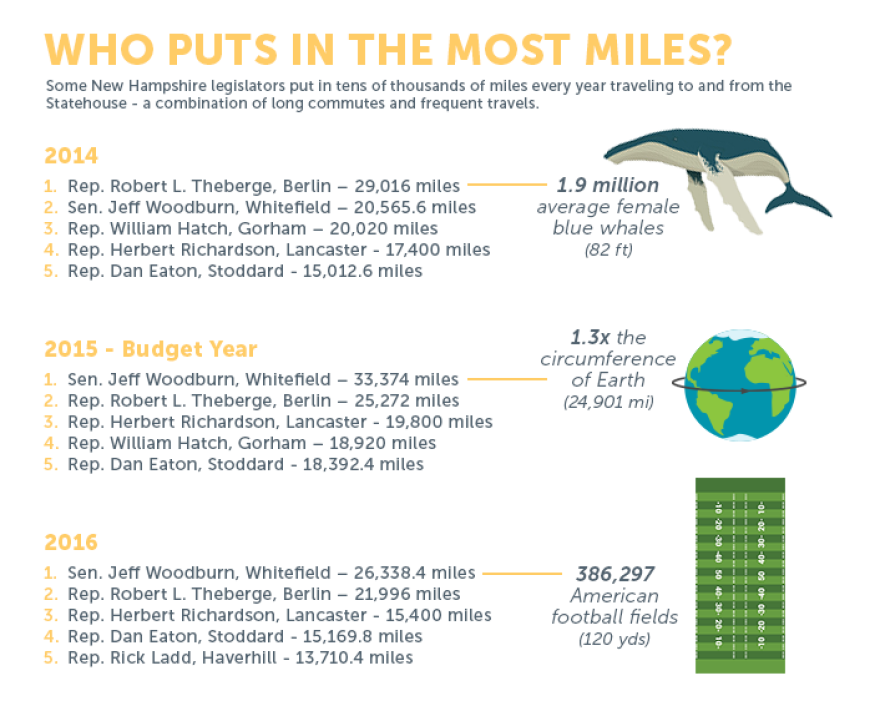The job of New Hampshire lawmaker isn’t terribly rewarding—at least if you’re talking about sheer salary. A spot in the state Legislature offers annual compensation of just $100, one of the lowest in the nation.
But though they don’t earn much in their Statehouse paychecks, some lawmakers regularly bring home extra cash just driving to and from Concord.

These payments come in the form of mileage reimbursements, with lawmakers getting about 53 cents for every mile they drive while commuting on legislative business. The system has been in place for years, and is similar to that used by many private companies and the federal government.
But an NHPR analysis of data from the past three years shows that reimbursements vary widely from lawmaker to lawmaker. Sometimes, that’s the result of simple geography: the further you live from Concord, the more mileage you're likely to rack up. Sometimes it's a reflection of a legislator’s workload at the Statehouse. And other times, it just seems like lawmakers enjoy coming to the capital – and getting compensated for doing so.

For instance Senator Jeff Woodburn collected more than $20,000 in mileage reimbursements in 2015. Woodburn, who lives in the Coos County town of Whitefield, has one of the longest commutes in the Statehouse: 180 miles round trip. He’s also a busy guy in Concord, as the Senate’s highest-ranking Democrat. So he has plenty of reason to make the trip to the Statehouse each week.
In fact, most lawmakers who chair committees or serve in leadership positions see bigger mileage checks, reflecting their more frequent trips to Concord. Senate President Chuck Morse of Salem brought home $9,500 in mileage reimbursements in 2015, the year he oversaw the crafting of the state budget.
North Country lawmakers were among the biggest recipients of mileage payments, with some collecting as much as $17,000 in a single year.

And then there are lawmakers collecting plenty in mileage payments who neither serve in leadership nor hail from the North Country. One of those is Rep. Dan Eaton, who averaged $10,000 a year in mileage payments since 2014, with a lot of those miles categorized on filings as “other.”
Rep. Eaton says that “other” refers to a range of things, including Democratic leadership meetings, discussions on policy issues with other lawmakers, and speaking engagements on the weekends.
“With the institutional knowledge and memory that I have, you are in high demand, and people want you for your advice and meetings and to help put things together,” said Eaton, who’s served more than three decades in the state Legislature.

Part of Eaton’s mileage haul has to do with committee assignment: He sits on the influential House Finance Committee, the busiest committee in the Legislature. Eaton claimed attendance in the Statehouse on 234 days in 2015. And over the past few years, Eaton has checked in more days than any other lawmaker.
Other lower-ranking lawmakers, with less time-intensive assignments, also make frequent visits to the Statehouse, with the mileage to prove it. Rep. Dennis Fields and Rep. Timothy Horrigan, neither of whom chair committees or serve in leadership roles, claimed mileage for about as many days in 2015 as the highest-ranking House member: House Speaker Shawn Jasper.

But not all lawmakers are seeing large mileage checks. Some are bringing home just a few bucks annually. Rep. Brian Dobson of Nottingham reported driving to the Statehouse just once for all of 2015. The reason: On the first House session day he resigned after being offered a job to work for then-Congressman Frank Guinta.
That same year Rep. Robert Graham and Rep. Rio Tilton only clocked in a combined six days. That’s because both members were elected in a special election after that year’s legislative session already wrapped up.
In 2015, the state spent more than $1 million dollars on lawmakers' mileage, averaging more than $2,000 per legislator. If all 424 members show up on a legislative session day, the state treasury ends up cutting checks totaling $17,000.








